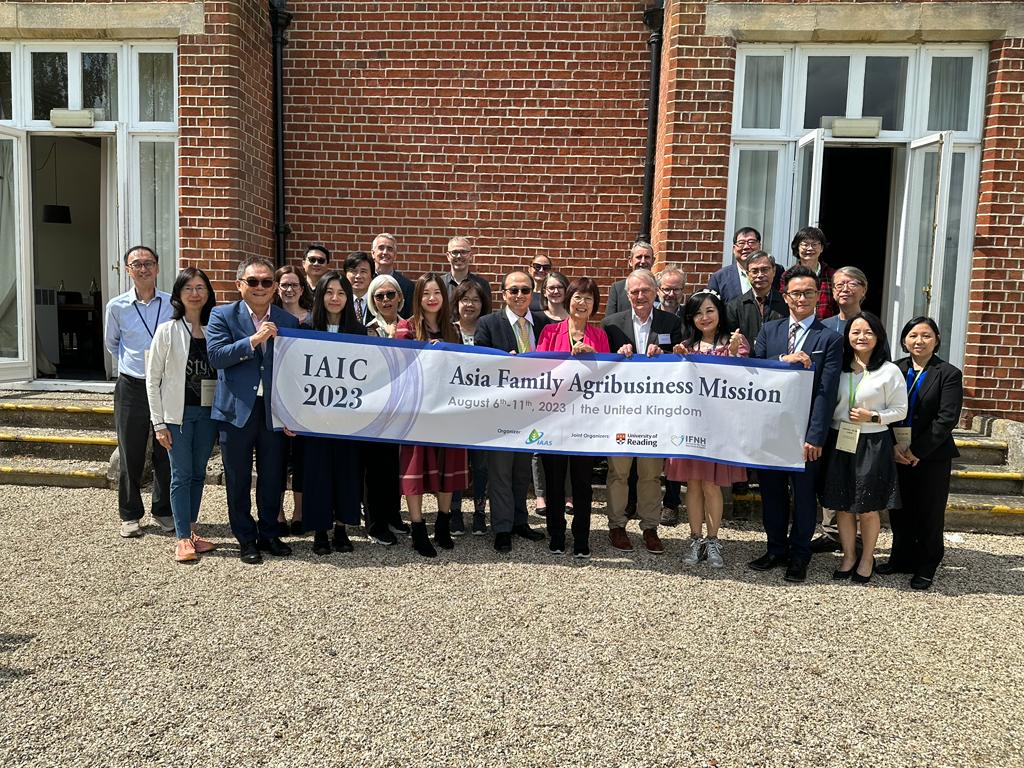The Institute for Food Nutrition and Health (IFNH) recently hosted the highly anticipated International Agriculture and Innovation Conference 2023 (IAIC 2023) in collaboration with the International Association for Agricultural Sustainability (IAAS).
Under the theme of Agro-industrialisation and Sustainability, the conference brought together leading experts, scholars, researchers, and industry stakeholders to explore transformative solutions for the agricultural and food sector.
The event explored three key themes: Agriculture Development in the Face of Change, Controlled Environment Agriculture, and Agriculture Innovation Systems, alongside insightful panel discussions.
At the conference, IFNH was represented by Professors Ian Givens (Director of the Institute for Food Nutrition and Health) and John Hammond (Head of Sustainable Agriculture and Food Systems), who gave presentations on their leading research across the UK, EU and Asia.
The IAIC 2023 was opened with a speech by Professor Tzong-Ru Lee, chairman of IAAS, emphasising the critical need for agro-industrialisation that balances economic growth with environmental preservation. This was followed by a keynote address from Professor Ian Givens, who shared IFNH’s leading research on dietary transitions for sustainable diets in the UK and India.
Dietary transitions for sustainable diets in the UK and India: Benefits or risks to health?
Professor Givens discussed how deficiencies in micronutrients such as iron and calcium, and their interactions with other micronutrients such as vitamins C, D, and B12 can cause serious health issues such as anaemia and inadequate bone development. Because of the type of carbohydrates they contain, millets can help the management of blood glucose in type 2 diabetes, a condition which is rapidly increasing in India.
Research into the dietary impacts of millets by IFNH and the International Crops Research Institute for the Semi-Arid Tropics (ICRISAT, India) has shown that the diverse group of small-grained dryland cereals have high variability of macro and micronutrient content within and between different types of millet. Therefore, more work is needed to better understand this variability and how it can be used to improve the role of millets in healthy diets
Professor Givens explained that, with help from complementary protein-rich foods and sources of essential nutrients not adequately supplied by plants, millets will assume a crucial role in fulfilling micronutrient requirements within sustainable and nourishing diets in arid regions such as India. Find out more from Connecting Research.
Intercropping for Sustainable Agriculture
Professor John Hammond presented his work on intercropping, an agricultural technique where two or more plant species are grown in proximity in the same field.
Professor Hammond explained how this method of farming can increase crop yields by up to 20% and improve soil health by reducing the need for synthetic fertilisers by up to 50%. Intercropping can also increase biodiversity, which increases the resilience of agricultural systems to climate change. This method provides a sustainable and efficient way to produce food, as it increases the productivity of land while reducing the need for synthetic fertilisers.
Professor Hammond summarised the LEGUMINOSE project, a collaborative project that he and researchers from the Department of Crop Science are working on. LEGUMINOSE aims to work with conventional and organic farmers to utilise intercropping for the benefit of their crop productivity and utility. LEGUMINOSE aims to transform legume-cereal from a niche practice to a mainstream method. Find out more on the LEGUMINOSE website.
Close to 300 scholars and industry professionals attended the on-line part conference from sectors including agribusiness, academia, and governmental agencies. The keynote presentations and networking sessions set a new benchmark for knowledge exchange and collaboration in agro-industrialization and sustainability.
IFNH is committed to continuing its work with IAAS with the aim of promoting sustainable practices in agriculture and food production through research, education, and collaboration and addressing global challenges while fostering solutions that drive positive change in the sector.

